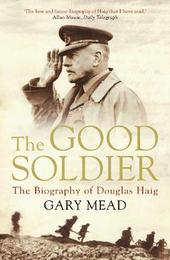
|
The Good Soldier: The Biography of Douglas Haig
Paperback / softback
Main Details
| Title |
The Good Soldier: The Biography of Douglas Haig
|
| Authors and Contributors |
By (author) Gary Mead
|
| Physical Properties |
| Format:Paperback / softback | | Pages:528 | | Dimensions(mm): Height 220,Width 135 |
|
| Category/Genre | First world war |
|---|
| ISBN/Barcode |
9781782392248
|
| Classifications | Dewey:940.40092 |
|---|
| Audience | |
|---|
| Edition |
Main
|
| Illustrations |
3x4pp b/w plates
|
|
Publishing Details |
| Publisher |
Atlantic Books
|
| Imprint |
Atlantic Books
|
| Publication Date |
4 September 2014 |
| Publication Country |
United Kingdom
|
Description
Posterity has not been kind to Douglas Haig, the commander of the British Expeditionary Force on the Western Front for much of the First World War. Haig has frequently been presented as a commander who sent his troops to slaughter in vast numbers at the Somme in 1916 and at Passchendaele the following year. The Good Soldier re-examines Haig's record in these battles and presents his predicament with a fresh eye. More importantly, it re-evaluates Haig himself, exploring the nature of the man, turning to both his early life and army career before 1914, as well as his unstinting work on behalf of ex-servicemen's organizations after 1918. Finally, in this definitive biography, the man emerges from the myth.
Author Biography
Gary Mead was a journalist for the Financial Times for ten years and has worked extensively with the BBC. He is the author of The Doughboys: America and the First World War (2000).
ReviewsThe best and fairest biography of Haig that I have read. -- Allan Massie * Daily Telegraph * A subtle treatment of Haig's complex character... Mead's Haig is not a marble statue, nor a caricature butcher and bungler, but a man of very human strengths and weaknesses. The Good Soldier is the most successful attempt yet at disentangling the historical Douglas Haig from the twin excesses of Haigiography and donkeydom... Very readable. -- Gary Sheffield * TLS * Engrossing... Here at last comes some redress for perhaps the most maligned of the principal actors in that tragedy [of] the First World War. -- Mary Skipwith * Field *
|